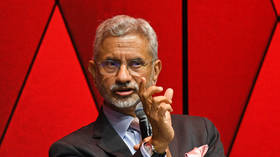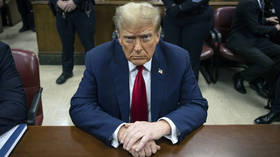BRICS not interested in weakening dollar – Indian FM

India and the other BRICS nations regularly discuss financial transactions but “have no interest in weakening the dollar,” Indian Foreign Minister Subrahmanyam Jaishankar has said. The remark comes after US President-elect Donald Trump recently threatened to impose 100% tariffs on the group of emerging economies.
In a social media post last month, Trump said that he would impose 100% tariffs on BRICS members if they create a common currency or “back any other currency to replace the mighty US dollar” in international trade. “Any country that tries should wave goodbye to America,” he warned.
Speaking at the Doha Forum in Qatar on Saturday, Jaishankar said that he was “not exactly sure what was the trigger” for Trump’s comments.
Indian Prime Minister Narendra Modi has a close relationship with Trump, and Washington and New Delhi “really don't have divisive issues,” he said.
“India has never been for de-dollarization,” he continued. “Right now there is no proposal to have a BRICS currency. BRICS do discuss financial transactions, [but] the United States is our largest trade partner and we have no interest in weakening the dollar at all.”
Russia, which currently holds the BRICS group’s rotating presidency, floated the idea of introducing a common currency in 2022. Brazilian President Luiz Inacio Lula da Silva echoed Moscow’s proposal last year, arguing that having the option of trading in another reserve currency would reduce the BRICS countries’ “vulnerability” to fluctuations in the dollar’s exchange rate.
Despite widespread speculation in the Western media, BRICS leaders stopped short of announcing plans for such a currency at their summit in the Russian city of Kazan in October. Instead, they pledged to set up a cross-border payment system to function alongside the Western SWIFT network, and to increase their use of local currencies in international trade.
“Cooperation within BRICS is not directed against anyone or anything – neither against the dollar nor against other currencies,” Kremlin spokesman Dmitry Peskov stated at the time. “It pursues the main goal of ensuring the interests of those countries that participate in this format.”
In a speech at the BRICS summit, Russian President Vladimir Putin warned that Washington’s weaponization of the dollar – through sanctions and denying countries access to the Western financial system – is a “big mistake” that will force countries “to look for other alternatives, which is what is happening.”
BRICS previously comprised Brazil, Russia, India, China, and South Africa, and was expanded in January to include Egypt, Iran, Ethiopia, and the United Arab Emirates. Around 30 other nations have expressed interest in joining the group of emerging economies.













